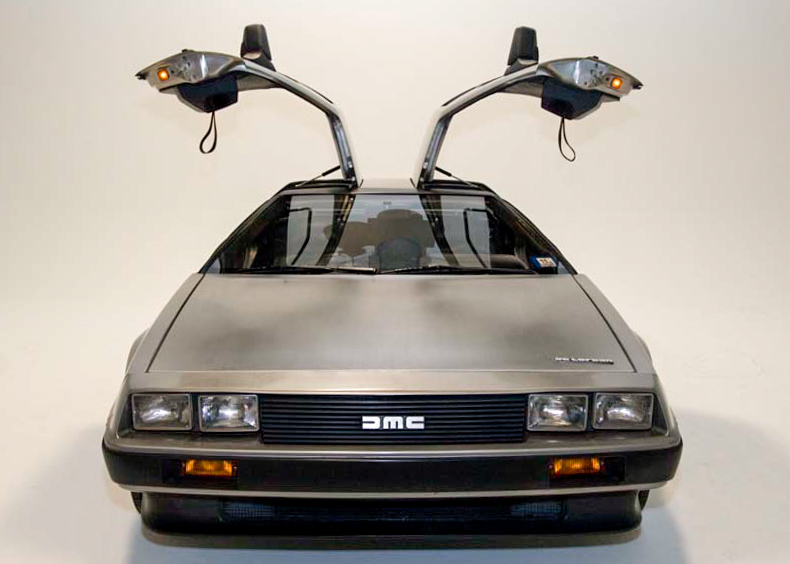
John DeLorean: Skidding in the Fast Lane
DeLOREAN
By John Z. DeLorean with Ted Schwarz
Zondervan Books. 349 pp. $17.95
HARD DRIVING
My Years with John DeLorean
By William Haddad
Random House. 193 pp. $17.95
WHAT ARE WE TO MAKE OF John DeLorean? For nearly 20 years now, DeLorean has been driving at breakneck speed against the grain of Detroit’s automotive establishment, and nothing — abject failure included — seems to deter him. These days, even as he faces a federal indictment on charges of racketeering, mail fraud, and tax evasion, Delorean is talking about putting an automobile that bears his name back on the road.
The DeLorean dream machine, engineered to be an “ethical” (and expensive) sports car, turned out to be a stainless steel-coated lemon. It is likely to be remembered as the Edsel of the ’80s. And DeLorean himself is likely to be remembered not behind its wheel, but in the clutches of the law, owing to his witless participation in an ill-conceived “sting” operation jointly choreographed by FBI and Drug Enforcement Administration flatfoots. A single videotaped episode is etched in our consciousness: DeLorean and a couple of business-suited undercover agents, all with champagne glasses hoisted, toasting a suitcase full of cocaine.
The image lingers, despite DeLorean’s subsequent acquittal on the cocaine charges. So does a question: Was John DeLorean guilty of anything else, and, if so, what? That’s the issue, more or less, both of these books seek to settle.
With respect to the spectacular failure of his automobile company, DeLorean submits, in his own book, something on the order of a nolo plea. “I was the captain of the Titanic,” he writes, “trying to bail her out by hand.” He does, however, offer an impassioned and convincing account of his entrapment by federal law-enforcement agents, who were assisted in the line of duty by a convicted drug-smuggler turned professional informant. (“It takes a crook to catch a crook,” a government prosecutor lamely told the jury at trial.)
Hard Driving: My Years with John DeLorean, a rather malevolent memoir by William Haddad, purposely ignores the cocaine matter. Haddad, a former reporter and political operative who became a DeLorean disciple and executive, as well as his go-between with the press, concentrates his considerable investigative energies on documenting DeLorean’s darker side. The John DeLorean of Hard Driving emerges as a lying, scheming, double-dealing, no-good manipulator of men and money.
The two authors plainly do not care for each other. “He sheds personalities as a snake sheds its skin,” Haddad writes of DeLorean. DeLorean, notwithstanding his “born-again” conversion to Christianity, sinks even lower. Haddad “seemed to have very poor personal hygiene,” he writes. “Do all informants smell bad?” DeLorean’s book is littered with similarly idiotic asides.
Despite the mutual and understandable enmity, Haddad writes about his former boss on a first-name basis. “For a long time,” he says, “I could not decide whether John had created DeLorean Motors intending to build a dream car, or whether from the very beginning it had all been an elaborate scam.” But now, apparently, Haddad has it figured out. “It was,” he writes, “a scam from the beginning.”
DeLorean’s big con, as Haddad tells it, was to siphon funds for his own use from the $250 million or so in capital he raised for manufacturing and marketing automobiles. Haddad engages readers in a drawn-out tease about the fate of some $17 million, money he says landed in a mysterious Panamanian corporation after being laundered through a Swiss bank account. This, apparently, is Hard Driving‘s smoking gun. (As for what really happened, DeLorean’s forthcoming trial in Detroit presumably will decide.)
DeLorean’s version of this story, and others, is far less persuasive. His explanation of why he formed so many different corporations — “to protect the investors as fully as possible” — is fairyland stuff. Pity those investors, too. One moment DeLorean passes himself off as an executive of formidable excellence, a manager who got where he was by successfully remaking entire divisions of General Motors. The next moment, however, he is sharing his sudden revelation over the scourge of his car company’s balance sheet: “Cash flow!”
Both of these accounts purport to be definitive, yet they shortchange readers in important details. What, exactly, went wrong? DeLorean never says. He glosses over the most nagging issues, and passes the blame for his problems to a variety of suspects, animate and otherwise — ranging from Sonja, a pseudonymous palm-reader whom DeLorean calls “one of the most astute people with whom I had ever discussed my company,” to a “drug-induced psychosis” that led him, willy-nilly, to his fateful meeting with federal agents and their hidden videotape camera.
As for Haddad, who worked for DeLorean in one capacity or another for 15 years (including three as DeLorean Motor Company’s vice president for planning and communications), one obvious question arises. As he puts it: “I will never fully understand how, given my investigative reporter’s background and instincts, I was fooled by DeLorean for so long.” Readers, though, may have an easier time of it. “My contract with DMC,” Haddad mentions early in his book, “generously provided for salary increases, perks, bonuses, and stock options.”
Money, power, greed — that’s what these books really are about. Haddad says DeLorean is the villain, a corporate con man par excellence; DeLorean claims he is the victim, the target of a conspiracy engineered by Haddad and other evil forces.
DeLorean, of course, has much more at stake. Yet he says he has chosen not to disclose the evidence that will vindicate him out of fear that the British government, which underwrote his automobile plant in Northern Ireland, then would forge documents to circumvent it. “If they don’t see what we have until we get into court,” he writes, “truth will carry the day.”
Maybe so. But readers of DeLorean’s book have good reason to believe he already has passed up that chance.
